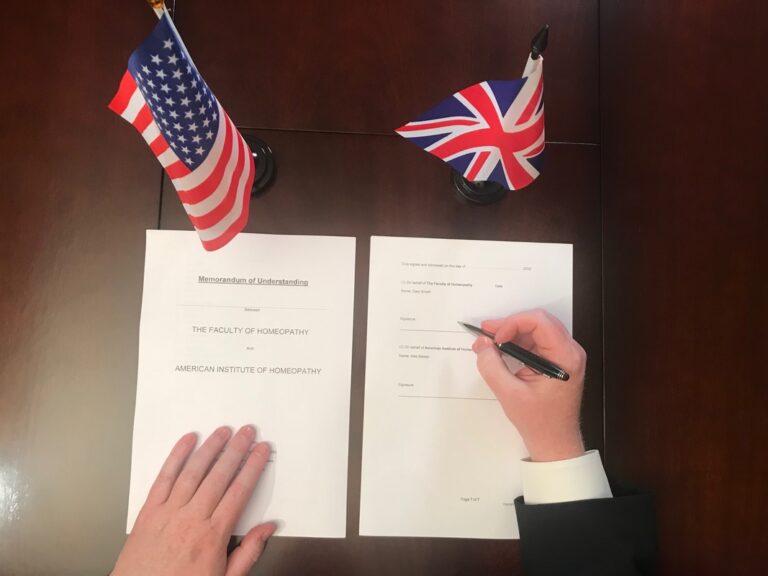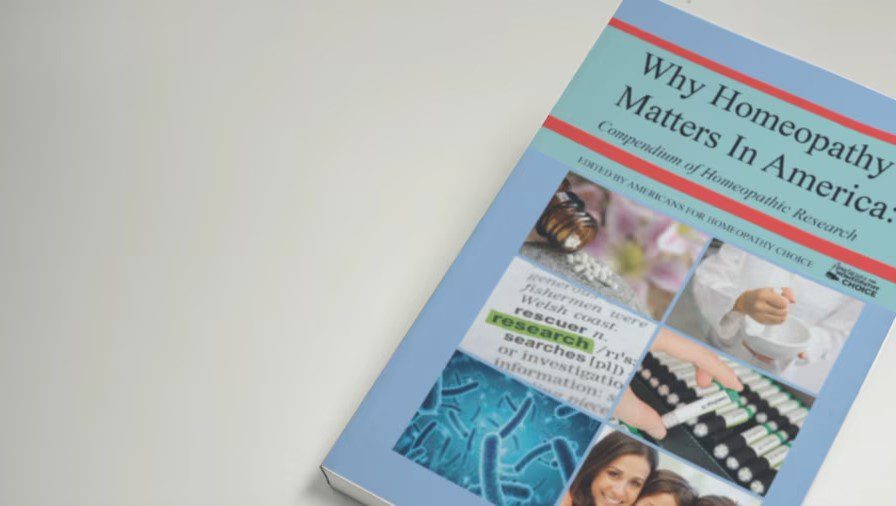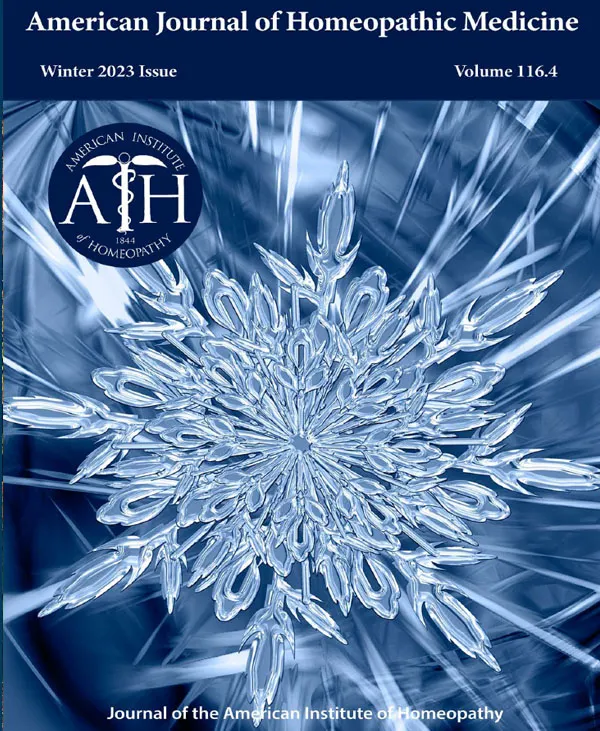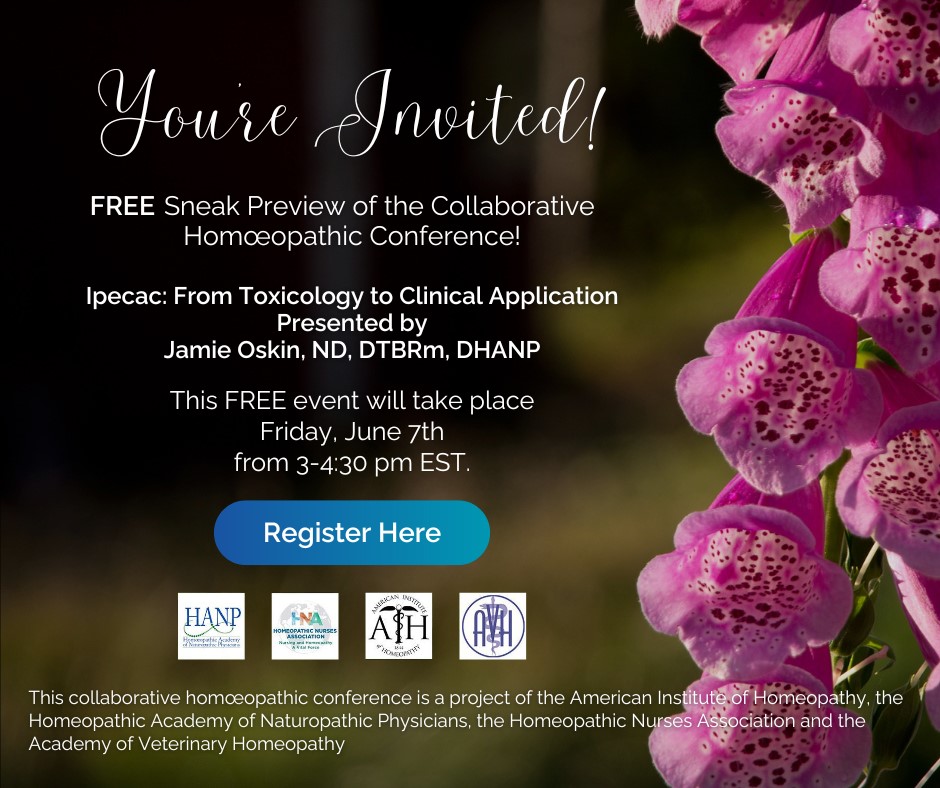
Written Comments to FDA
June 1, 2015
In response to the FDA’s recent request for written comments, the American Institute of Homeopathy (AIH) has prepared the following statement.
The AIH
Established in 1844, the AIH is the oldest extant national professional medical society in the United States. For the past 171 years, the AIH has been the voice of the licensed professional homeopathic medical community. Our mission includes safeguarding the homeopathic medical profession as well as promoting and supporting the practice of homeopathic medicine. As the use of homeopathic medicines becomes increasingly popular, we share the concerns of the FDA with regard to the regulation of homeopathic drug products for the protection of public safety.
Our concern with the importance of regulating homeopathy was evident in 1938 when three-term Senator Royal S. Copeland, MD (NY), a former President of AIH, sponsored the Food, Drug and Cosmetic Act. In 1980, AIH member Wyrth Post Baker, MD, DHt, worked to establish and incorporate the Homeopathic Pharmacopoeia Convention of the United States (HPCUS), which had initially been under the purview of the AIH, since its first publication by the Pharmacopoeia Convention of the American Institute of Homeopathy in 1897. The AIH has a deep and abiding interest in all of the work promoting and preserving homeopathy in the United States as a public healthcare option.
AIH members are licensed physicians (medical, osteopathic and naturopathic), dentists, veterinarians, nurse practitioners, physician assistants, registered pharmacists and pharmacologists who choose to use homeopathy alongside their conventional medical specialties. AIH members are devoted to patient care and their use of homeopathy springs from their thirst for excellence in pursuit of the most effective and the safest means of helping their patients. AIH professionals meet all the requirements of training by their state licensing bodies in addition to the many seminars and training programs they pursue annually in homeopathic continuing medical education. Many of our providers maintain dual board certifications: one in their conventional medical specialty and another in homeopathic therapeutics.
The AIH supports the ongoing professional development of its members and acts as a liaison between policy makers, practitioners and the public. Our members have worked closely with many other professional and certifying organizations and volunteered in both national and international public health organizations.
Because AIH members are highly trained in both mainstream and homeopathic medicine, we occupy a unique spot in the healthcare profession. Our combined expertise could be leveraged to provide an educated and an unbiased perspective to the FDA with regard to many of your questions, including the ones raised in this evaluation.
The entire AIH membership is united in the opinion that homeopathic over-the-counter drug products (OTC) play a pivotal role in our therapeutic armamentarium. Many of those who experience a beneficial result from these OTC products in an acute condition eventually go on to consult expert homeopathic physicians for advice on other, more chronic conditions.
Consumer attitudes toward homeopathic products have shifted in recent years as more consumers have been exposed to homeopathic medicines and have felt their effects first hand.
The AIH believes that the Compliance Policy Guide 400.400 has been very successful in promoting the FDA’s public health mission and appreciates the opportunity to work with the FDA in reviewing its success. We are confident that the majority of homeopathic drug products on the market are manufactured and labeled in substantial compliance with the Compliance Policy Guide and the Food, Drug and Cosmetic Act, ensuring consumers have safe and clearly identified homeopathic products to choose for their health care needs. In several instances the FDA has acted appropriately in insisting that products not in compliance be removed from the marketplace.
The Compliance Policy Guide has contributed significantly to improving cost, quality and access to safe homeopathic drug products that provides consumer choice for the American public, and that the current regulatory structure is adequate to meet the needs of consumer access and ensure standards of quality by homeopathic drug manufacturers.
Use of Homeopathy
According to the most recently published data from the National Center for Health Statistics and NIH published in February of this year, as of 2012, over 5 million American adults (or 2.2% of the U.S. population) had used homeopathy within the previous year. This number represents an increase from 1.8% in 2007. Unpublished data from researchers at Harvard Medical School indicates that homeopathy was most commonly used (19%) for respiratory & ENT complaints such as head and chest colds, sore throats, and allergic rhinitis. Another 12% used homeopathic medicines for musculoskeletal complaints (sprains, and muscle & joint pains). Eighty-one percent of users did not see a practitioner and presumably self-prescribed or prescribed based on the recommendations of friends or family. Among those who used homeopathy and other complementary therapies to address a health-related condition, 32% of those who used dietary supplements felt that it helped their health-related condition a great deal, while 42% of those using homeopathy (who did not see a practitioner) and 64% of those using homeopathy (who did see a practitioner) felt that it helped their health-related condition a great deal.
In many high income countries CAM utilization is becoming increasingly popular, with up to 65% of the population reporting that they have used this form of medicine, including homeopathy. Increasing sales of homeopathic drugs in the U.S. reflects the increasing consumer interest in utilizing these products despite the efforts and claims by some skeptics that there is no benefit of these therapies.
Some skeptics claim that homeopathy and natural medicines have become popular only because conventional medicine is either unavailable or too expensive. However, studies in many countries, including Russia, indicate that the trend toward increasing use of homeopathic medicines is particularly strong among the upper socioeconomic classes where individuals would rather pay out-of-pocket for homeopathic treatment than accept state subsidized conventional medical care.
Patients who choose to use homeopathic medicines as part of their treatment regimen have been found to be much more compliant, highly motivated about their medical care, well educated, and conscientious about their lifestyle choices. Demographic research indicates that consumers of homeopathic products are well informed, savvy and directed individuals who have taken time to investigate the pros and cons of different modalities. Numerous surveys over the past 150 years have confirmed that people who seek homeopathic treatment tend to be considerably more educated than those who don’t.
A recent Swiss government-sponsored survey evaluating patient satisfaction and side effects in primary care compared homeopathic and conventional medical treatment in over three thousand patients. They found the following: (1) that a higher percentage of patients, at the time of the initial homeopathic evaluation, had more chronic and severe conditions than patients who initially seek care from conventional physicians, (2) that homeopathic patients were more often “completely satisfied” with their treatment (53 percent vs. 43 percent), and that (3) homeopathic patients experienced significantly fewer side effects (7.3 percent vs. 16.1 percent) than conventionally treated patients. What is particularly significant about this survey is the observation that homeopathic patients tend to have more serious illness at presentation, yet experience much more satisfaction as a result of treatment than those who received conventional medical care. This survey also confirmed a common observation that people who seek homeopathic treatment are much more educated than those who do not (32.4 percent vs. 24.7 percent had received “higher education”).
Data Sources
There are many consumer based data sources providing information on the risks and benefits of homeopathic medicines; some of these sources provide accurate information, but many do not. There are a great number of sources that provide information that is unfairly biased against homeopathy, while other sources may claim unrealistic benefits and neglect to mention possible side effects. One of the best sources for accurate information is found by consulting a trained and licensed homeopathic physician. Experienced homeopaths rely on archives of published data spanning more than 200 years of homeopathic history. These data sources include treated cases, clinical research, and academic studies published in peer-reviewed journals from around the world. Since homeopathy is integral to the public health services of many nations, there is ongoing research into this clinical modality, and articles are being published in many well-respected medical journals.
Roughly 35% percent of U.S. adults go online to learn about and to self-diagnose a medical condition in themselves or for someone they know; 59% of the adult population looks up health information for themselves online, while 39% search for someone else. Eighty-two percent search using the most common search engines (i.e.: Google, Bing and Yahoo), approximately 13% go straight to a website that focuses on health information, such as WebMD; only 2% use Wikipedia, and another 1% get their information through Facebook and other social hubs.
Of the large number of Internet users seeking information about health conditions and treatment options, 46% decided they needed professional medical health care based on what they found; 38% believed they could treat their condition at home, and 11% fall somewhere in the middle: consulting with a health care professional, but also treating themselves at home.
Although the Internet offers easy access and a wider target audience, disadvantages include lack of access by the poor and the fact that electronic communication and publishing is
not always reliable The WHO has published guidelines entitled “Medical products and the Internet: a guide to ï¬nding reliable information.” These guidelines could also be used for ï¬nding reliable information on traditional medicine (TM) and complementary and alternative medicine (CAM) and homeopathy.
To assist professionals and the general public, the AIH recently published a guide to homeopathic research on our website: www.homeopathyusa.org.
It is important for the consumer to be able to evaluate online information critically by means of an independent source. Both reliability and quality of the information need to be assessed. Instruments for testing the reliability and quality of general health care information may be developed to help consumers with this evaluation. One notable example is the “Discern Instrument in the United Kingdom,” designed to help evaluate information in order to identify the most reliable and high quality information.
The media also plays an important role in providing consumers with information on homeopathic drugs. So that information provided is accurate, journalists who report on health issues should have easy access to reliable information. The media needs to be reminded about the importance of ensuring accuracy, credibility, balance, legitimacy and responsibility.
The World Health Organization has published the: “Guidelines on Developing Consumer Information on Proper Use of Traditional, Complementary and Alternative Medicine”. These guidelines are intended to provide technical assistance in order to help Member States in developing context-speciï¬c and reliable consumer information promoting proper use of TM and CAM. The long-term goal is to maximize the beneï¬ts and minimize the risks of TM/CAM use by empowering consumers to become active participants in health care and to make informed choices. A reference or a link within the FDA website to dependable resources such as the National Center for Complementary and Integrative Health (NCCIH), the HPUS and the AIH would be helpful to consumers, providers, and media.
Publicly accessible accurate information about homeopathy serves the purpose of spreading knowledge about its potential health beneï¬ts, as well as its potential risks. However, it is essential to have information sources that provide a well-balanced, reliable message supported by research in this field.
It is unfortunate that some sites, such as the National Center for Complementary and Integrative Health (NCCIH), do not provide more detailed information about homeopathy. Certainly, the FDA is one of those federal agencies that might help lead the effort to disseminate unbiased and factual information about homeopathic medicines. Guidance from the agency will generally be perceived as highly reliable and less subject to industry or other third party agendas.
Despite the efforts of organizations, healthcare practitioners, and the consumers themselves, as mentioned above, there are some significant possibilities for improvement.
- More effort could be made by the FDA and the NCCIH to educate the public and providers about homeopathic medicines. Specific attention could be paid to distinguishing homeopathic drugs from dietary supplements, herbal preparations and nutritional products.
- The FDA could encourage research funding, i.e., by the NCCIH, which could help better clarify the safety, efficacy and role of homeopathic medicines in the consumer marketplace. Such research could be publicized to raise consumer awareness.
- The FDA could partner with Non-Governmental Organizations affiliated with homeopathy like the American Association of Homeopathic Pharmacists (AAHP), the Homeopathic Pharmacopeia Convention of the United States (HPCUS), and the AIH to coordinate efforts to ensure broad dissemination of accurate information about homeopathy.
We strongly advocate the formation of a national database; perhaps under the auspices of the FDA, which would provide publicly accessible information, free from bias, where homeopathic scientific research and consumer safety data could be continuously updated. The AIH would be happy to assist the FDA to establish such a system.
Safety of Homeopathy
In the United States, official homeopathic products are classified as drugs and must have a monograph in the Homoeopathic Pharmacopoeia of the United States (HPUS) as opposed to non-official homeopathic drugs, which may be marketed if ingredients are generally recognized as homeopathic. The FDA distinguishes between official (HPUS-listed ingredients) and non-official homeopathic drugs, both of which are legal. Eligibility for inclusion in the HPUS requires that the homeopathic product be proven to be safe, effective and prepared according to HPUS provisions.
Homeopathic products must meet standards for quality and purity set out in the HPUS. The presence of the initials HPUS on the label of a product assures that legal standards of strength, quality, purity and packing are respected. Homeopathic products sold as over the counter (OTC) drug are intended solely for self-limiting disease conditions amenable to self-diagnosis and treatment. Homeopathic products for conditions not amenable to OTC use must be marketed as prescription products.
Physicians within the AIH report that, while adverse events do occur with homeopathic treatment, such occurrences are many magnitudes less in frequency than their experiences with mainstream medicines, and these events tend to be mild and transient in nature. Many relate that the safety of homeopathic medicines is helpful in prescribing for complex patients, such as older patients who are on multiple conventional medications for chronic medical conditions. As the number of medications increases, the risk for interactions and adverse drug reactions increases as well. AIH members find that homeopathic medicines represent a much safer alternative for self-limited conditions in these patients. Rather than using an OTC medication (e.g., an NSAID), which might be contraindicated, short-term use of a homeopathic medicine can help alleviate symptoms, while reducing concerns for adverse drug reactions.
A systematic review of the literature from 1970-1995 revealed 19 clinical trials with detailed information on adverse events and a mean incidence of adverse events of 9.4 in the homeopathic groups and 6.17 in the placebo groups. The adverse events were mild and transient. The majority of case reports described aggravations of pre-existing symptoms rather than new symptoms and the overall level of causal association was low. Some reports described products that were mislabeled as homeopathic. For homeopathic pathogenetic trials, there was great heterogeneity. The mean incidence of effects was 54%, and overall they were similar to nocebo effects in phase I RCTs.
The health technology assessment study commissioned by the Swiss government examined the safety of homeopathy and concluded that “the use of medium and high potencies is free from toxic and unexpected organ effects”.
A highly publicized systematic review of the literature from 1978 2010 found a total of 1159 case reports of adverse events from homeopathy published from 17 different countries. The adverse events ranged from mild to severe and included 4 fatalities. The most common adverse events were allergic reactions and intoxications. Upon examining the paper in further detail, one finds that 1070 of the reports are of “unspecified remedies” reported to a German poison control center, much like the reports from our own National Poison Data System. There is no validation that all of those 1070 reports are from actual homeopathic products. Nevertheless, the vast majority of these cases represent accidental ingestions by young children with limited or no side effects. The remaining 89 cases are from unspecified compounds. In other words, it is not known if these reports even reflect homeopathic cases, and if they do, whether they are single or complex products, or have other non-homeopathic ingredients added to them. Some of the compounds ingested are reported by name and are clearly not traditional homeopathic medicines, and may contain non-homeopathic ingredients. Nearly all of the reports lack documentation of concomitant conventional medical treatments. Several did use traditional homeopathic medicines but in very low dilutions (mother tinctures, or 1X potency, which is 10-1), which would generally not be prescribed by homeopathic providers. Finally, several of the adverse events are clearly misattributed to homeopathy. For example, the authors attributed a case of bladder cancer that developed 7 years following a homeopathic treatment to the homeopathic medicine that was administered. In summary, it is rather remarkable that a review of 32 years’ worth of literature across 17 countries, many in which homeopathy is used quite widely by the general population, found little evidence for serious toxicity from homeopathic treatment.
Data from the U.S. National Poison Data System also fails to make it clear exactly what percentage of the product exposures in these cases are truly homeopathic medicines vs. other products that claim to be homeopathic on the label but also contain pharmaceutically active amounts of herbs, dietary supplements, or pharmaceuticals. Second, even these so-called homeopathic products appear to have a better safety profile than other pharmaceuticals in the database that was examined.
In summary, homeopathic medicines are extremely safe, especially when compared to other OTC products. While adverse events are reported with homeopathic medicines, the vast majority are mild and self-limited.
The Compliance Policy Guidelines in place are sufficiently detailed and explicit, and the actions taken by the FDA to enforce them have been appropriate and timely. The AIH would like to see the FDA continue its efforts to regulate the sale of these medicines in the health care market.
The AIH appreciates the FDA taking the time to reevaluate the important topic of homeopathic medicines and to continue to work to safeguard the health of our nation. The AIH strongly shares the FDA’s concern to protect the public from harm and to ensure continued access to these important and clinically relevant medicines. The AIH looks forward to working alongside the FDA in a more interactive relationship throughout the next 25 years to help protect public health. We look forward to integrating our expertise, and broad experience in the field of homeopathic medicine and science with the FDA to achieve safety and regulation for the health of the American public.
Thank you.
Ronald D. Whitmont, MD
President, American Institute of Homeopathy
Clinical Assistant Professor of Family and Community Medicine
New York Medical College
- Clarke TC, Black LI, Stussman BJ, Barnes PM, Nahin RL. Trends in the use of complementary health approaches among adults: United States, 2002-2012. Natl Health Stat Rep. 2015 Feb 10;(79):1 16.
Dossett M., et. al., manuscript in preparation.
Clines, F. “With Medicine Itself Sick, Russians Turn to Herbs,” New York Times, December 31, 1990.
Rothstein, W. Physicians in the Nineteenth Century. Baltimore: Johns Hopkins University Press, 1972.
Marian F, Joost K, Saini KD, et al Patient satisfaction and side effects in primary care: an observational study comparing homeopathy and conventional medicine. BMC Comp Alt Med 2008, 8:52. doi:10.1186/1472-6882-8-52.
Fox, S., & Duggan, M. (2013). Pew Research Center: Internet, Science & Tech. Retrieved April 10, 2015, from http://www.pewinternet.org/2013/01/15/health-online-2013/
Gandelsonas, C. (2002). Communicating for Development: Experience from the Urban Environment. London: ITDG Publishing.
WHO. (1999). Medical Products and the Internet: A Guide to Finding Reliable Information. World Health Organization.
Charnock, D. (1998). The DISCERN handbook: quality criteria for consumer health information on treatment choices. Abingdon: Radcliff Medical Press.
WHO. Guidelines on Developing Consumer Information on Proper Use of Traditional, Complementary and Alternative Medicine (2004; 109 pages)
Dantas F, Rampes H. Do homeopathic medicines provoke adverse effects? A systematic review. Br Homeopath J. 2000 Jul;89 Suppl 1:S35 8.
Bornhoeft G, Matthiessen PF, editors. Homeopathy in Healthcare Effectiveness, Appropriateness, Safety, Costs [Internet]. Berlin, Heidelberg: Springer Berlin Heidelberg; 2011 [cited 2015 Apr 28]. Available from: http://link.springer.com/10.1007/978-3-642-20638-2
Posadzki P, Alotaibi A, Ernst E. Adverse effects of homeopathy: a systematic review of published case reports and case series. Int J Clin Pract. 2012 Dec;66(12):1178 88.
Von Mach M-A, Habermehl P, Zepp F, Weilemann LS. [Drug poisonings in childhood at a regional poisons unit]. Klin Pädiatr. 2006 Feb;218(1):31 3.
Johnson C. Is homeopathy safe? A response to Posadzki et al. J Altern Complement Med N Y N. 2014 Jan;20(1):67 8.
Tournier A, Roberts ER, Viksveen P. Adverse effects of homeopathy: a systematic review of published case reports and case series – comment by Tournier et al. Int J Clin Pract. 2013 Apr;67(4):388 9.
Mowry JB, Spyker DA, Cantilena LR, Bailey JE, Ford M. 2012 Annual Report of the American Association of Poison Control Centers’ National Poison Data System (NPDS): 30th Annual Report. Clin Toxicol Phila Pa. 2013 Dec;51(10):949 1229.
Latest News & Updates
Latest Issue of the AJHM
AJHM – Winter 2023
Volume 116 Number 4
Table of Contents
- Editorial: In this Issue
- Homeopathic PuZZle?
- A Case of Erectile Dysfunction and Anejaculation in a Diabetic Patient
- Iron and Its Salts: Materia Medica and Illustration
- Suppression in the Organon
- An Appreciation of Jacques Jouanny’s Life and a Review of His Opus “The Essentials of Homeopathic Therapeutics”





